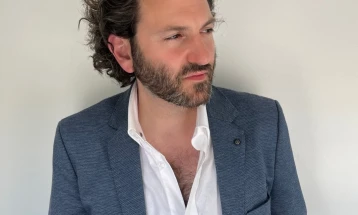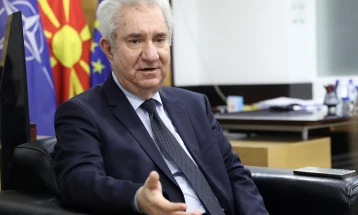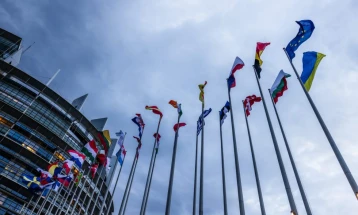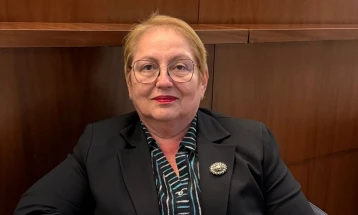Judiciary reforms not quick fixes, will take time until results are visible, Papa tells MIA
- Judiciary reforms are not quick fixes. We need to communicate with citizens that if we do that reform, it will take that amount of time until we see the results.

Skopje, 9 February 2025 (MIA) - Judiciary reforms are not quick fixes. We need to communicate with citizens that if we do that reform, it will take that amount of time until we see the results. We do not see results with reform immediately. The public needs to be informed with sincerity about what’s going to happen, how much time and what are the expected results. If vetting is implemented, the country should be prepared, as it was the case in Albania, for a shortage of human resources and judges and prosecutors in the system, says international expert on judiciary and anti-corruption Helena Papa in an interview with MIA.
Papa says there is a geopolitical momentum that needs to be used by all the Western Balkan countries as there is maybe also some will from the EU member states, adding one must not forget the process is demanding, and the EU member states need a consensus about who will enter.
Papa was one of the panelists at the session of the National Convention on the European Union in North Macedonia on judiciary reforms that took place earlier in the week. She is well-acquainted with the judiciary system in the region and took part in the judiciary reforms in Albania. Papa is an independent expert on human rights and member of the Council of Europe Committee for the Prevention of Torture and Inhuman or Degrading Treatment or Punishment (CPT).

On the vetting in Albania, she says the reform was not only focused on the vetting of judges, and prosecutors or legal practitioners, it was also focused on changing the architecture of independent justice institutions.
"We established a high judicial council with more extensive powers, more independent. The composition of the high judicial council changed, and the minister of justice and the head of state were extracted from its composition in order to make this body less influenced by the politics. In Albania, a new body was created, that of high prosecutorial council, which did not exist before. Another independent institution was created, that of the high inspector of justice, which is dealing with the investigation of disciplinary infringements. All these coupled with the vetting but also with an increase of salaries for judges and prosecutors, after the justice reform and after the vetting, judges who had the double or the triple of their salaries before, all these different measures took place in order to create judicial system that is more independent, has the adequate human and financial resources, and becomes more efficient," says Papa.
She adds that after seven years of implementation of the reform, 269 judges and prosecutors were dismissed, 163 also exited the system for different reasons, either because they retired or because they resigned or because someone got sick, and 373 judges and prosecutors were confirmed in duty.
At the beginning, she says, it was expected that 15-20% of judges and prosecutors will get out of the system, but it happened that these went out of proportion in a way.
"If we consider only the judges who were dismissed by this first level of vetting, we can approximately calculate to 40% of judges. If we include the numbers of those who left the system because of other reasons, we go to 50-55% and with only 40-45% of judges and prosecutors who were confirmed in duty. So, you can see the impact that vetting had in the human resources of the system. It was a huge impact, which also needed additional measures taken by the judicial system either by the high judicial council or the high prosecutor council in cooperation with the School of Magistrates to have new judges and prosecutors in the system," says Papa.

According to her, a lot of mitigative measures need to be adopted, such as a judicial map where maybe there is a need to merge certain courts or public prosecution offices but also to be prepared to have a new generation of candidates in the system.
"Also, other means or tools that have been implemented are the transfer or delegation of judges to particular cases in order to create the panel for adjudication of cases. So, these are things that need to be very well thought in advance before such a system is implemented. I do believe the results can be good at the end but meanwhile the system has to suffer a lot from the shortage of human resources, so I do believe that this type of reforms need to be thought carefully and in the situation where there is really a systematic problem with corruption and failure of integrity in the country," says Papa.
She is aware of the concerns in relation to the 2023 amendments of the Criminal Code and the reduction of the sanctions of some criminal offenses.
"The impact and concern is that from the moment that you reduce sanctions, you reduce the statute of limitations which is directly related to the investigation that the prosecution does, so it means that the prosecution will have less time to investigate a corruption offense or an offense related to financial and economic crime. We all know that it is difficult to investigate this type of offenses, it takes time, you need specialized human resources to be used, and by decreasing that amount of time, of course, it jeopardizes the quality of work of prosecution offices and relevant investigators," notes Papa.
She says North Macedonia has a strategic and a good legal framework, whereas the main institutions in the prevention and fight against corruption exist, but implementation is still a challenge.
"The implementation is a challenge maybe because the human resources are lacking, maybe this legislation has not been fully endorsed or understood or maybe there is some lack of will. So, I think the focus should be to really implement the legislation, I am not in favor of changing very often the legislation, because changing very often the legislation brings something else which impacts the legal certainty. But I am in favor of implementing the legislation, discover the gaps and improve them, but not change the legislation without analyzing the impact of its implementation," says Papa.

Regarding the country's Euro-integration path and if it is possible for the Western Balkans to join the EU by 2030, she believes it is an ambitious project, but does not mean it is out of reach for the countries.
"It is important to be conscious about the fact that several factors are to be taken into consideration - the political will of the countries, the political will of the EU members, of course regional cooperation is also important, and what is also the most important is the pace of reforms. In the new methodology, a great focus has been in the rule of law and fundamentals, so everything will depend on how much the countries advance in this agenda," says Papa.
She adds there is a geopolitical momentum that needs to be used by all the Western Balkan countries, as there is maybe also some will from the EU member states.
"Let’s not forget that the process is demanding and the EU member states need a consensus about who will enter. I cannot say much about the fact that North Macedonia and Albania have been decoupled, I believe at some point maybe it is better so, because every country will be evaluated based on its merits. Maybe Albania today is a little bit more advanced because they have opened the first cluster, that does not mean that in six months North Macedonia can reach that stage and even advance. Everything depends on the will of North Macedonia’s public institutions on the political class and the desire to advance in this agenda of rule of law and fundamentals," underlines Papa in the MIA interview.
Neda Dimova Prokikj
Photo: Frosina Naskovikj
Video and editing: Andrej Brankovikj
Translation: MIA English Desk







